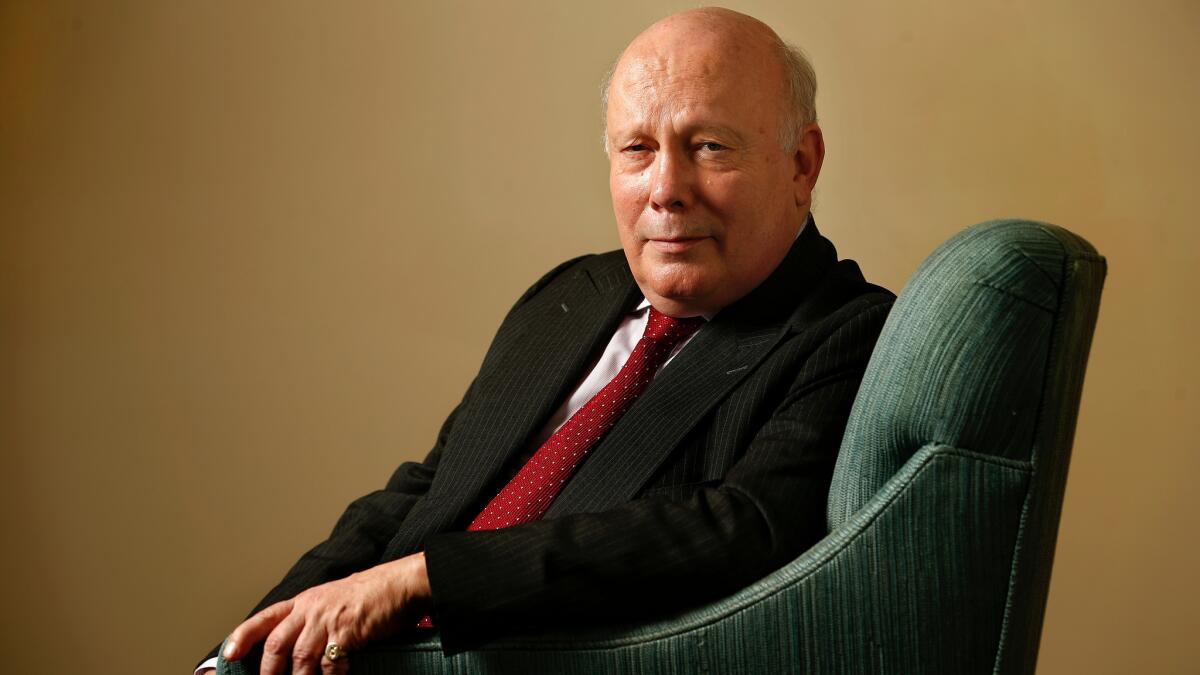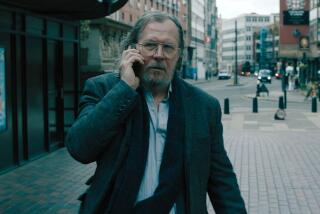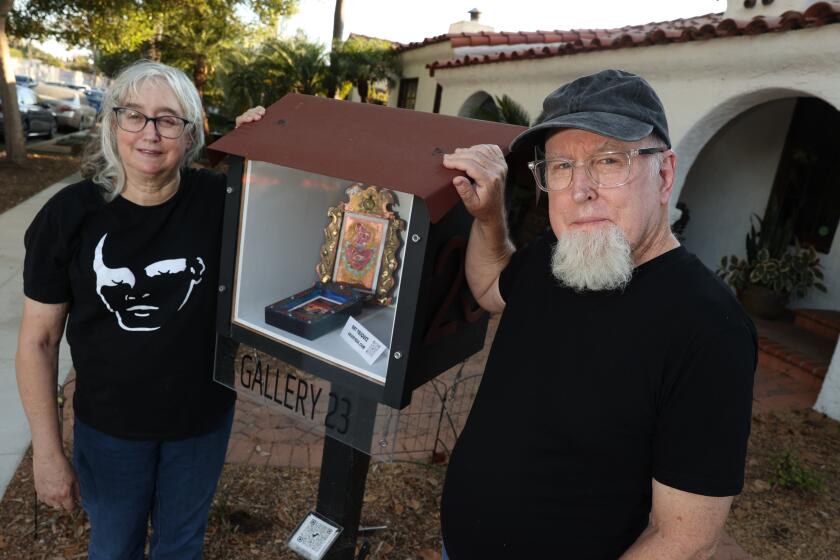For Julian Fellowes, after ‘Downton’ and ‘School of Rock’ comes ‘The Gilded Age’

Ever since “Downton Abbey” creator Julian Fellowes won an Oscar for the 2001 film “Gosford Park,” his professional dance card has been overflowing with suitors. On the heels of the “Downton” finale, Fellowes came out with a digital version of “Belgravia,” a romantic novel set in 19th-century London, to be followed in July by the hardcover.
He’s up for a Tony on June 12 for the book of “School of Rock,” and he’s about to embark on “The Gilded Age” for NBC. And Amazon Prime recently released “Dr. Thorne,” a miniseries adapted from Anthony Trollope’s 19th-century novel about a country doctor.
In the final episode of “Downton Abbey,” everyone lives happily ever after, but I suppose you had to do that.
Your choice is either to make them all live happily ever after or kill them all in a bus or something. But I feel when an audience has been faithful to you for six years, you’re trying to be true to the people who’ve been faithful to you. The main thing was Edith was happy after six years of unbroken misery. And I think people had earned that.
See the most-read stories in Entertainment this hour >>
That sounds like something the Earl of Grantham would say. Toward the end, he says the family must be loyal to the cook, who has been loyal to the family for years. I sensed some nostalgia, not just for how groovy the period was, but also for noblesse oblige.
Interdependent society, because it did have class elements, is out of step with the zeitgeist these days. But you can’t bring about great reforms without losing some things of value. There are still communities that are very dependent on the house, and the house is very dependent on the community. And I think there’s something appealing in belonging. You need people to need you. The modern very rich live differently: They don’t buy 300,000 acres; they have a house in Manhattan and a house in the South of France and in Martinique. I wish them well, but for me, when you try to live everywhere, you end up living nowhere.
Is there any talk of a “Downton” spinoff or movie?
I don’t know about spinoff, but I hope there will be a movie. There’s an audience out there for it. But they just have to make that decision.
Let’s talk about “Belgravia.”
“Belgravia,” my departure. The Orion Publishing house came to me because they wanted to release a book in the 19th-century way — one chapter a week — accompanied by the 21st century, so it wasn’t released in a magazine as it would have been in 1860. It was released on the Internet, and it was accompanied by an app. You go on the app and you go around the houses that I describe in the novel. You also get it recorded by Juliet Stevenson. Apart from everything else, I was flattered that they came to me, because I was this old fart and it seemed very kind of cutting edge. But again it’s familiar territory — it’s a love story between 1815 and 1840.
Why did you start “Belgravia” with a one-paragraph prelude telling readers that they would be able to relate to these people?
I suppose if I do have a theme, it is that it’s wrong to see people in the past as different from us. I feel that if people, particularly the young, could understand that history is about real people making choices, thinking they were doing the right thing when often they were not, and that we are the result of those choices, they would be more interested in it. We ought to know what [those choices] are and why they made them, because when we come up against exactly the same choice, when we have no sense of history, we are very likely to do the wrong thing again.
Where does “The Gilded Age” stand?
It stands really with me up to my neck in research, and I’m clearing the decks, so that when I start “Gilded Age,” I’m only doing “Gilded Age.” These people were extraordinary. You can see why they frightened the old guard, because they saw no boundaries. They wanted to build a palace, they built a palace. They wanted to buy a yacht, they bought a yacht. And the old guard in New York weren’t like that at all, and suddenly this whirlwind of couture descended on their heads. They redesigned being rich. They created a rich culture that we still have — people who are rich are rich in a way that was established in America in the 1880s, ’90s, 1900s. It was different from Europe.
In what way?
Something like Newport would never have happened in any other country, where you have huge palaces, and then about 20 yards away, another huge palace, and 20 yards beyond that another huge palace. In England right up to the 1930s, when people made good money, they would buy an estate of 5,000 acres and they’d have to look after Nanny. The Americans of the 1880s and ’90s didn’t want too much of that.
How do you create such involving characters?
We had wonderful actors. But as to why they’re involving, I think they’re decent people trying to do their best. I think we don’t patronize them. If it had been made in the ’50s, the family would have been gracious and charming and all the servants would have been comic. If it had been made in the ’90s, the servants would have been victims trodden down by their employers and the family would have been vile and mendacious and horrible. But we didn’t do either of those. They’re just people. I think that’s part of why it was so popular.
Speaking of actors, I thought it was interesting that 30 years ago, Disney cast you in a film when you auditioned in London, but they wouldn’t even give you an audition in L.A.
They thought the English actors in L.A. they’d never heard of wouldn’t be as good as the ones they could find in London.
That’s something American actors complain about now — a perceived bias in favor of British actors.
I’ve come across it. I don’t agree with it. I think British actors have the edge when it comes to theater. The tradition of theater and theater performing is very deep inside British training and acting. But I think the Americans have led the world in screen acting. I don’t think we have screen actors of the level of Tom Hanks. You look at how extraordinarily subtle he can be and this incredible injection of reality that he always gives to his performances, I just find absolutely astonishing. Whereas the English tend to have a slight theatrical unreality in what they’re doing. Even in the old days, people like Henry Fonda were streets ahead of Lawrence Olivier when it came to screen acting. It’s an American art.
For someone who’s, as you said earlier, an old guy, I assume Andrew Lloyd Webber came to you for the book of Broadway’s “School of Rock.” Not what I would call …
A natural Julian Fellowes production? It was completely through Andrew. I loved the film, and I could see why he thought it could be a stage musical, and again, it seemed so far from “Downton.” And I loved the idea of the two of us past pension age writing a rock musical for Broadway. I just thought it was hilarious.
You and Andrew Lloyd Webber are older, but so is rock.
We were the generation that invented rock. There isn’t so much distance.
There’s more distance from the setting of “Dr. Thorne,” your new Amazon Prime series adapted from an Anthony Trollope novel. What attracts you to his work?
For Trollope, nobody is all good or all bad. He has an entirely modern recognition that most human beings are a mixture of the two, and he has a mercy in his judgments that even Dickens lacks. Dickens’ heroines are all shining bright, while his villains are irredeemably evil. Trollope’s are neither. I think his moral compass, his forgiveness, if you like, is much more in tune with a modern reader.
Follow The Times’ arts team @culturemonster.
More to Read
The biggest entertainment stories
Get our big stories about Hollywood, film, television, music, arts, culture and more right in your inbox as soon as they publish.
You may occasionally receive promotional content from the Los Angeles Times.










